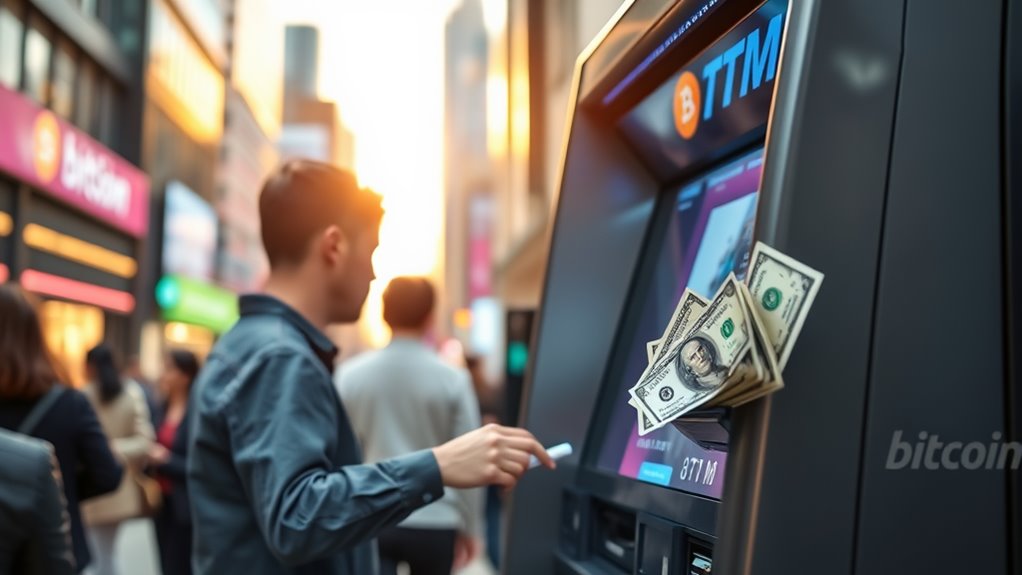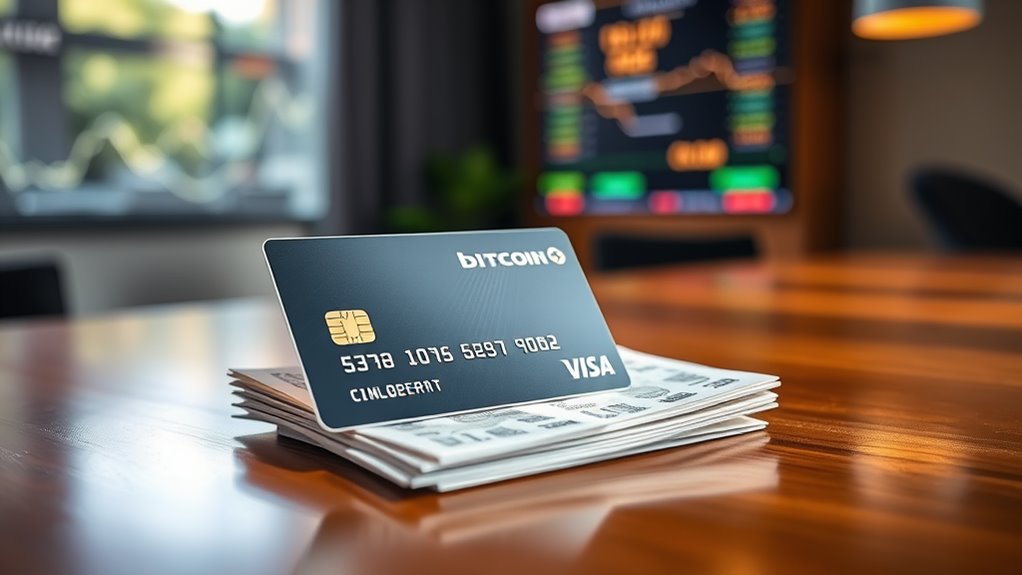
Selling Bitcoin for Cash: The Essential Guide
Converting Bitcoin to cash involves selecting the right exchange platform, considering Bitcoin ATMs, or using peer-to-peer trading networks. Each method carries different fees, security considerations, and processing times. Major exchanges like Coinbase and Binance offer competitive rates but require verification. Bitcoin ATMs provide immediate access but with higher fees. Tax implications should be considered as Bitcoin sales may trigger capital gains liability. Proper security measures throughout the process guarantee protection of your digital assets.
Key Takeaways
- Compare exchange platforms based on fees, security features, and available payment methods to maximize your cash returns.
- Bitcoin ATMs provide immediate cash access with varying exchange rates and transaction limits across 37,000+ global locations.
- Peer-to-peer trading offers lower fees and greater privacy but requires careful verification of counterparty profiles.
- Converting Bitcoin triggers capital gains tax liability, requiring proper transaction documentation for accurate tax reporting.
- Implement strong security practices including two-factor authentication and cold storage when selling Bitcoin for cash.
Understanding Bitcoin's Cash Conversion Process

When individuals decide to convert their Bitcoin holdings into traditional currency, understanding the basic process becomes essential for maximizing value and minimizing potential complications.
Converting Bitcoin requires understanding the process to maximize value and avoid unnecessary complications.
Bitcoin can be sold through various payment methods including bank transfers, wire transfers, or cash transactions, each with different processing times and fee structures.
The cryptocurrency market's inherent volatility means conversion values may change rapidly, sometimes within minutes. Most platforms charge transaction fees that vary based on payment method, transaction size, and current market conditions.
Users should also be prepared for security verification processes, which are standard requirements for regulatory compliance.
For those seeking immediate liquidity, Bitcoin ATMs offer instant cash conversion, though typically at premium rates compared to online exchanges.
Understanding the mechanics of blockchain technology is fundamental to appreciating how Bitcoin transactions are verified and recorded during the cash conversion process.
Choosing the Right Exchange Platform for Your Needs

Selecting the ideal Bitcoin exchange platform represents an essential decision for cryptocurrency investors looking to convert their digital assets into cash. When evaluating options, users should consider several key factors, including fee structures, security measures, and payment methods.
Established exchanges like Coinbase, Binance, and Kraken offer competitive rates and considerable liquidity, though their fee models vary markedly. Many platforms implement tiered fee structures based on trading volume, while others provide commission-free trades under certain conditions.
Geographic availability also matters, as some exchanges operate only in specific regions.
User interface complexity differs across platforms, with some catering to beginners through intuitive designs. For maximum security, investors should prioritize exchanges with robust verification processes, two-factor authentication, and strong regulatory compliance records.
Understanding different trading pair options will help you efficiently convert your Bitcoin to your preferred fiat currency with minimal losses.
Bitcoin ATMs: Quick Cash Access and Considerations

Bitcoin ATMs represent a convenient bridge between digital currencies and physical cash, operating similarly to traditional ATMs but with cryptocurrency functionality.
With over 37,221 machines worldwide, primarily in North America, these devices allow users to buy or sell Bitcoin for immediate cash access.
Transactions typically require identity verification and sometimes a digital wallet. While convenient, users should be aware that exchange rates vary based on market conditions, and transaction limits exist in many regions—California, for example, imposes a $1,000 daily limit.
For security, it's advisable to use ATMs from reputable operators like Bitcoin Depot or Genesis Bytes.
The growing network of these machines not only provides financial services but also contributes to local economic development, job creation, and increased cryptocurrency awareness in communities.
Beginners interested in using Bitcoin ATMs should first familiarize themselves with user-friendly interfaces available on crypto exchanges to better understand the transaction process.
Peer-to-Peer Trading: Benefits and Security Measures

How does one access cash for Bitcoin without involving traditional financial institutions? Peer-to-peer (P2P) trading platforms offer a compelling solution, enabling direct transactions between individuals.
These marketplaces allow users to set their own prices, choose from various payment methods, and negotiate trading conditions.
The benefits of P2P trading include lower transaction fees, enhanced privacy, and greater control over the exchange process. Users can access diverse payment options that cater to their geographical location and preferences.
However, these advantages come with responsibility. To guarantee security, most P2P platforms implement escrow services, verification processes, and feedback systems. Smart contracts and AI monitoring further protect users from potential fraud.
When utilizing P2P exchanges, reviewing counterparty profiles and following local regulations remain essential practices for safe trading.
P2P platforms are particularly valuable for users in regions with restrictions where traditional banking options for cryptocurrency exchange might be limited or unavailable.
Crypto Debit Cards as a Conversion Alternative

Crypto debit cards offer a convenient alternative for Bitcoin holders who want to access their funds without selling through traditional methods.
These cards allow users to spend their cryptocurrency directly, converting it to fiat currency at the point of sale, which eliminates the need for manual conversions or bank transfers.
With acceptance at millions of merchants worldwide through networks like Visa and Mastercard, crypto debit cards provide instant access to Bitcoin value anywhere traditional payment cards are accepted.
Most crypto debit cards integrate with digital wallet systems that securely store the private keys needed to authorize transactions when you make purchases.
Spending Without Selling
Many Bitcoin holders face a common dilemma: how to utilize their digital assets without converting them to cash first. Crypto debit cards provide an elegant solution to this challenge by automatically converting cryptocurrency to fiat currency at the point of sale.
These cards function through partnerships with major networks like Visa and Mastercard, ensuring acceptance at millions of merchants worldwide. Users simply load their cards with Bitcoin or other supported cryptocurrencies, which are then converted when making purchases.
Beyond convenience, crypto debit cards offer compelling benefits including cashback rewards—sometimes reaching up to 10%—and enhanced security features like two-factor authentication.
However, users should consider potential drawbacks, including tax implications (as each transaction may trigger capital gains tax) and exposure to cryptocurrency price volatility. For optimal control and security of your Bitcoin before transferring to a debit card, consider investing in a hardware wallet that provides maximum protection for your digital assets.
Instant Access Anywhere
While traditional banking methods often involve lengthy waiting periods for cash access, crypto debit cards eliminate this barrier by enabling instant cryptocurrency conversion at the point of sale.
These cards, partnered with major networks like Visa and MasterCard, allow users to spend their crypto holdings at millions of merchants worldwide without manually converting to fiat currency first.
Despite global acceptance, regional restrictions apply to some providers, such as Coinbase cards being limited to U.S. customers.
Providers like SpectroCoin offer enhanced features including European IBANs for increased functionality.
Users should consider the varying fee structures, including transaction and ATM withdrawal fees, alongside potential rewards programs offering cashback of up to 10% depending on provider and usage level.
Security features typically include two-factor authentication and card freezing capabilities, though users remain responsible for vigilance against potential fraud.
Unlike with cold storage wallets, crypto debit cards keep assets in hot wallets connected to the internet, offering convenience at the expense of maximum security.
Navigating Transaction Fees and Hidden Costs

Converting Bitcoin to cash requires consideration of a thorough fee comparison matrix across various platforms and methods.
Exchanges, peer-to-peer marketplaces, and Bitcoin ATMs each present different fee structures, with costs typically ranging from 1% to 15% depending on the service and urgency.
Savvy investors can minimize conversion costs by selecting payment methods with lower fees, timing transactions during periods of reduced network congestion, and comparing rates across multiple platforms before committing to a transaction.
Understanding proper risk management is crucial when converting cryptocurrencies to fiat currency, especially during periods of high market volatility.
Fee Comparison Matrix
The complex landscape of Bitcoin transaction fees presents numerous variables that impact the final cost of converting cryptocurrency to cash. Understanding these costs across different platforms is essential for maximizing value when selling Bitcoin.
Network fees typically range from $0.50-$2.50 per transaction, while brokerage fees vary considerably between platforms. Bitcoin generally maintains lower fees than Ethereum, which faces higher costs due to dApp usage and congestion.
When selecting a platform, investors should consider both explicit fees and potential hidden costs. Fee structures often follow tiered models, with high-volume transactions receiving preferential rates.
Users can manage costs by utilizing fee estimation tools and adjusting transaction timing around network congestion. The Lightning Network offers an alternative fee structure that prioritizes capital efficiency over energy consumption. For frequent small transactions, the Lightning Network enables near-instant Bitcoin transfers with significantly reduced fees compared to on-chain transactions.
Minimizing Conversion Costs
Savvy Bitcoin holders can greatly reduce expenses when converting to cash by understanding the multi-layered fee structure inherent in cryptocurrency transactions.
Network congestion notably impacts costs, making timing an important consideration when selling Bitcoin.
Combining strategies offers the best results: batch transactions when possible, utilize the Lightning Network for smaller transfers, and monitor mempool.space to identify periods of lower network activity.
Choosing exchanges with tiered fee structures rewards higher volume traders with discounted rates.
Peer-to-peer transactions may eliminate exchange fees entirely, though they require additional security precautions.
When using exchanges, compare withdrawal fees carefully, as these often vary considerably between platforms.
Understanding the difference between network fees, exchange fees, and hidden costs like market spreads guarantees Bitcoin sellers can maximize their returns.
Consider using hardware wallets when storing Bitcoin before selling to maximize security against exchange hacks and other vulnerabilities that could compromise your assets.
Tax Implications When Converting Bitcoin to Cash

Understanding how Bitcoin transactions impact your tax obligations represents a crucial aspect of cryptocurrency ownership and trading.
When selling Bitcoin for cash, the IRS treats this as a disposal of property, triggering capital gains tax liability.
The tax rate depends on how long the Bitcoin was held before selling. Transactions involving Bitcoin held for less than a year incur short-term capital gains taxed at ordinary income rates (0-37%).
Bitcoin held longer than a year qualifies for more favorable long-term capital gains rates (0%, 15%, or 20%).
Investors must carefully track their cost basis—the original purchase price of Bitcoin—and the fair market value at the time of sale to accurately calculate gains or losses.
Maintaining detailed records is essential, as exchanges may not provide complete transaction information for tax reporting purposes.
Securing Your Funds Throughout the Selling Process

While managing tax obligations requires careful accounting, protecting your funds throughout the Bitcoin selling process demands equally meticulous attention to security.
Experts recommend selecting reputable exchanges like Coinbase or Binance that implement robust security measures.
When selling Bitcoin, enable two-factor authentication on all accounts and utilize cold wallets for storing the majority of your holdings.
For P2P transactions, consider platforms that offer escrow services to reduce fraud risks.
Never conduct transactions on public devices or unsecured networks.
Protect private keys vigilantly and implement strong, unique passwords for all accounts—ideally managed through a secure password manager.
After completing sales, withdraw funds immediately to secure accounts.
Regular software updates and awareness of phishing attempts further minimize vulnerability to attacks during the selling process.
Frequently Asked Questions
Can I Sell Bitcoin Without Revealing My Identity?
Individuals can sell Bitcoin anonymously through Bitcoin ATMs, peer-to-peer platforms without KYC requirements, in-person trades, or using privacy-enhancing techniques like VPNs and non-custodial wallets, though legal restrictions and higher fees may apply.
How Do Global Political Events Affect Bitcoin's Selling Price?
Politicians play economic roulette, and Bitcoin's price dances accordingly. Regulatory changes, geopolitical tensions, monetary policies, and sanctions all impact market sentiment, creating volatility that influences Bitcoin's value in the global marketplace.
Is There a Minimum Amount of Bitcoin Required for Selling?
Minimum selling requirements for Bitcoin vary by platform. Centralized exchanges like Crypto.com require as little as $1 equivalent, Kraken requires 0.0001 BTC, while services like MoonPay have higher minimums of 1 BTC.
What Happens if I Send Bitcoin to the Wrong Address?
Bitcoin sent to the wrong address is typically unrecoverable. Transactions are irreversible once confirmed. Recovery depends entirely on identifying and contacting the recipient, who must voluntarily return the funds, if possible at all.
How Long Does Bitcoin Remain in a "Pending" Transaction State?
Like a lone traveler awaiting passage, Bitcoin typically remains pending until receiving one confirmation (about 10 minutes). Factors like network congestion and transaction fees can extend this period from minutes to hours.
Conclusion
Converting Bitcoin to cash requires careful consideration of platforms, fees, and security measures. Whether using exchanges, ATMs, or peer-to-peer methods, each option presents distinct advantages and challenges. Have you weighed the tax implications against your immediate need for liquidity? By understanding these essential components and implementing proper security protocols, investors can navigate the conversion process efficiently while protecting their financial interests and remaining compliant with regulations.














